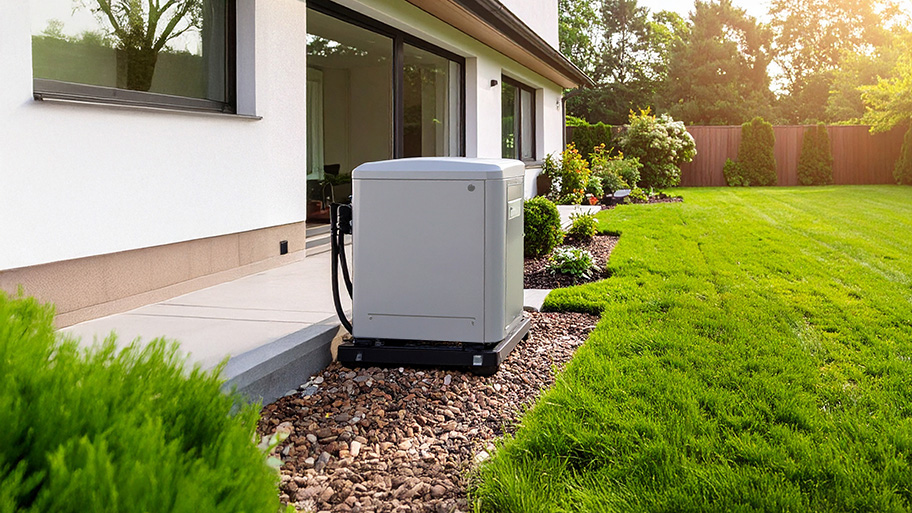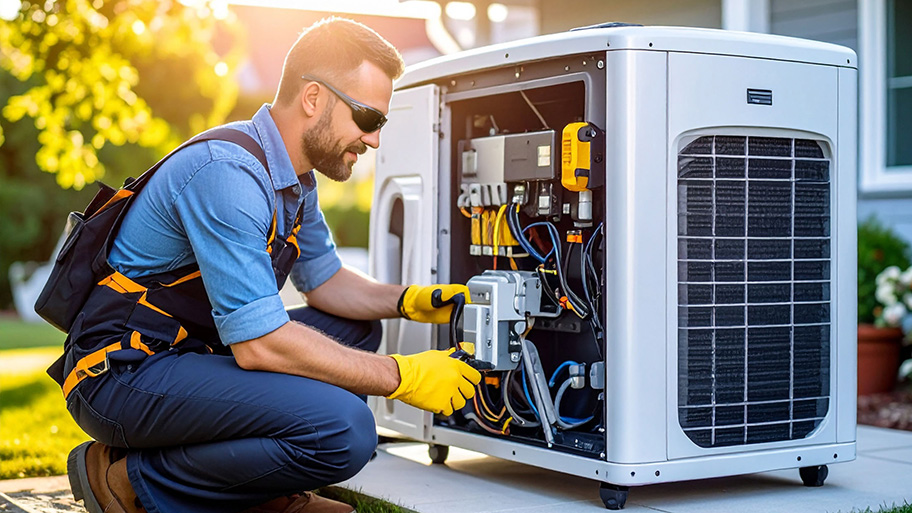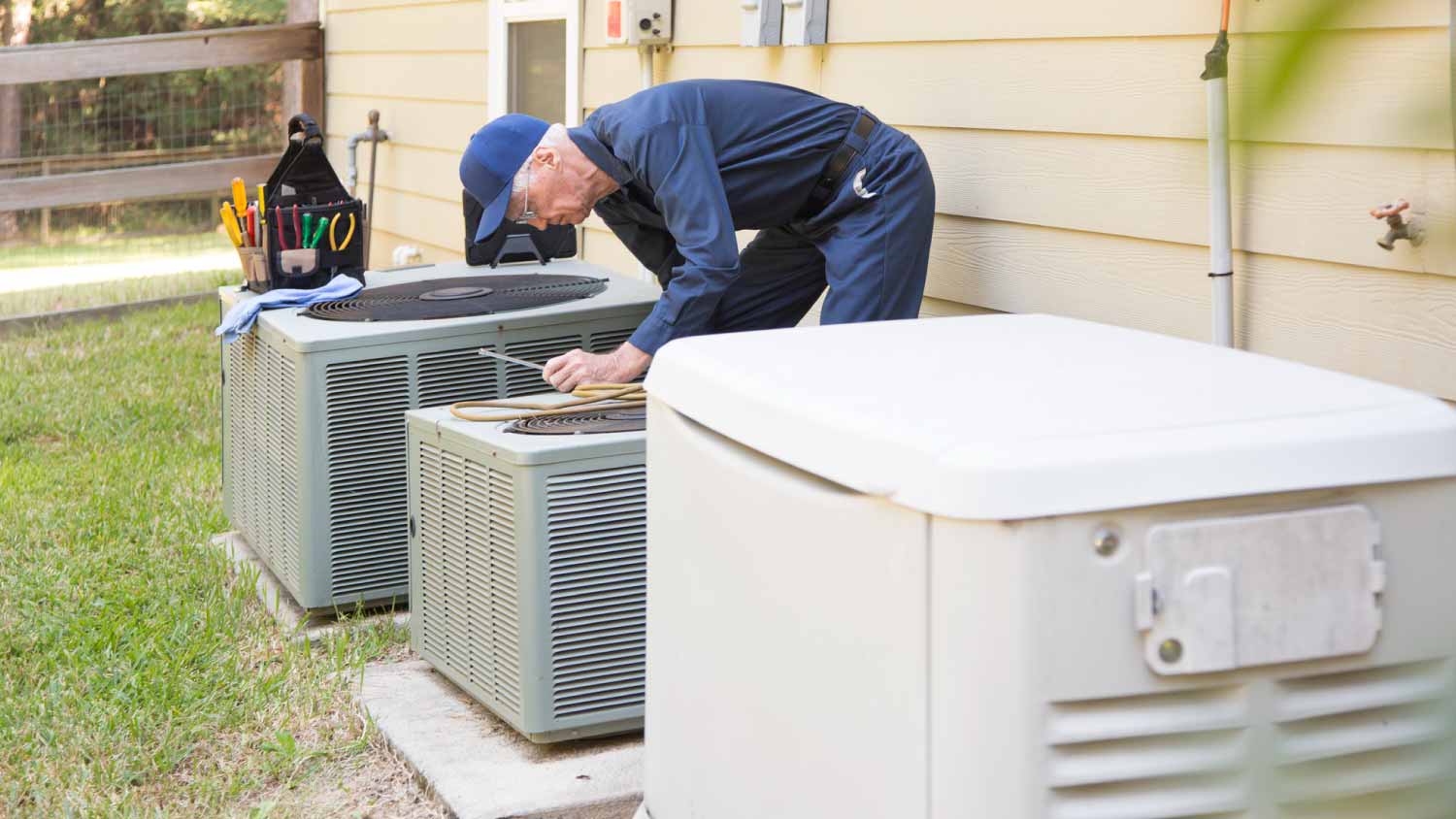
The average cost of a whole-house generator falls between $5,000 and $25,000. Keep reading to learn how much you can expect to spend.
Ensure all of your must-haves stay powered during an outage


Consider how often you'll use your generator; frequent outages or high energy needs may require larger whole-house generators, while portable ones may suffice for limited energy needs and infrequent use.
Generators vary in wattage and types, from small portable generators for specific appliances to whole-home generators capable of powering an entire household.
Understanding starting, running, and surge wattage is vital when determining your generator size.
Power outages are inconvenient and nerve-wracking in any situation, but when they persist for days or even longer, they can be disastrous. Prepare for power outages by answering the question, “What size generator do I need?”
An emergency generator is your lifeline to keep the lights on and power all of your essential devices, systems, and appliances in the event of an outage. These come in various types and sizes, so it’s important to consider which will be the best solution for your home. Use this helpful guide to determine the best generator size for your home.
Use this handy guide to determine the necessary wattage of your generator.
| Purpose | Tools or Appliances | Wattages |
|---|---|---|
| Recreation | Power tools, small appliances, lights | 500–3,000 Watts |
| Recreation | Mid-size appliances, heating and cooling | 3,100–6,000 Watts |
| Emergency power | Heating and cooling, large appliances, water heaters | 6,100–10,000 Watts |
| Emergency Power | Entire home | 10,100 Watts and above |
Generators come in different wattages, and various types of generators suit different energy needs. Smaller generators can provide power for a few select appliances, while whole-home generators have the capacity to supply electricity to an entire household. These are the main factors to consider when selecting the right model for your home.
The first step in finding the right size generator is to make a list of your must-have devices and electronics, including items like refrigerators, air conditioners, lights, and essential electronic devices. Then, check the wattage ratings of these appliances, which can typically be found on their labels or in their user manuals. Keep in mind that different modes or settings may consume varying amounts of power. Finally, add up the wattage of everything on your list to determine the total power you’ll need to generate during an outage.
For reference, here are the average power ratings of the most common devices and appliances.
| Device or Appliance | Power Rating (watts) |
|---|---|
| Gas furnace | 400–800 |
| Electric furnace | 10,000–50,000 |
| Space heater | 200–20,000 |
| Window AC unit | 500–1,500 |
| Central AC | 2,000–5,000 |
| Water heater | 1,125–4,000 |
| Ceiling fan | 35–75 |
| Refrigerator | 150–400 |
| Chest freezer | 200–400 |
| Microwave | 600–1700 |
| TV | 60–120 |
| Computer | 100–250 |
| Smartphone charger | 4–7 |
| Incandescent bulb | 40–150 |
| LED bulb | 4–25 |
| LED tube light | 8–36 |
When determining what size generator you need, it’s essential to understand three different power ratings: Starting, running, and surge wattage. The wattage, or power output required by the generator, depends on the type of devices and appliances it needs to operate.
A local home generator installation pro can break down the numbers and help you find the best fit for your home’s energy needs.
A generator’s starting wattage is the power needed for an appliance to initiate its operation. Typically, the starting wattage is two to three times higher than the running wattage, which is the power required to keep the appliance running continuously. Keep in mind that many electronic devices and appliances demand higher wattage during start-up and lower wattage to continue operating.
When a power outage occurs, a generator needs to adjust to the surge in power demands from appliances that run continuously, including HVAC systems, water heaters, refrigerators, and more. If additional appliances like space heaters or microwaves are active during the outage, the generator will need sufficient wattage capabilities to power those as well.
Running wattage, also known as rated wattage, is the amount of electricity necessary to maintain the continuous operation of an electronic device or appliance. Manufacturers often specify running wattage in the user manual or on the device or appliance itself. If the running wattage is not specified on the device or appliance, you can approximate it using the following formula: Watts = Volts x Amps.
Surge wattage represents the maximum amount of power a generator can deliver. If all of a home’s appliances and devices are expected to run off the generator, it’s a good idea to add a buffer of roughly 2,000 watts to ensure everything is covered.
Another important point to consider when choosing a generator size is how often you expect to use it. If you live in an area with frequent outages or have high energy needs, you may want to consider large whole-house generator sizes with greater capacity.
Portable generators can come in handy for rare, infrequent outages or the occasional camping trip, but they’re limited in their capabilities. For example, portable generators can’t get wet, so if you live in an area prone to inclement weather, you won’t be able to hook the generator up to your house and use it safely until the winds and rain subside. Furthermore, as these typically run on fuel, running them for extended periods of time can be costly.

Generators come in various types, including portable, inverter, and standby or whole-home generators. The generator type you choose can impact the size requirements or limit your options.
| Type of Generator | Best For |
|---|---|
| Portable Generators | Powering one or two appliances or devices, camping, and those shopping for something cost-effective. |
| Inverter Generators | Providing stable power for sensitive electronics. |
| Stand-by or Whole Home Generators | Those that reside in areas with frequent power outages, need to power medical equipment, and have increased demands for electricity. |
Portable generators are versatile and come in a range of sizes. These units are the smallest and most cost-effective choice, capable of powering one or two essential appliances or devices during an outage. Some smaller portable generators are also convenient for camping and outdoor activities.
Inverter generators are more compact and efficient than standard portable generators. These generators provide clean and stable power, making them suitable for sensitive electronics. Choosing between an inverter generator vs. a standard portable generator will mainly come down to your budget. Inverter generators perform better, but they are typically more expensive than standard generators.
Standby generators, sometimes called whole-home generators, are larger, permanent installations that can power your entire home. They are typically more powerful and come with an automatic transfer switch for seamless power restoration. If you live in an area with frequent outages, have important medical equipment to keep powered, or have greater power demands, investing in the cost of a whole-house generator will be your most reliable solution.
From average costs to expert advice, get all the answers you need to get your job done.

The average cost of a whole-house generator falls between $5,000 and $25,000. Keep reading to learn how much you can expect to spend.

The cost to install a generator transfer switch depends on several factors. Our guide will help you understand all of the costs.

Keeping on top of generator maintenance and repairs gives you extra peace of mind as a homeowner. Find out how much regular generator maintenance costs.

Whole house generators can power homes when electric problems hit, but they aren’t for everyone. Here’s what you should know when you’re thinking about buying.

Whole house generators are a power alternative that can deal with frequent blackouts and other problems. Here’s how they function.

Natural gas generators can tap into existing gas lines so they never run out of fuel. Here’s how they work and how they’re used.